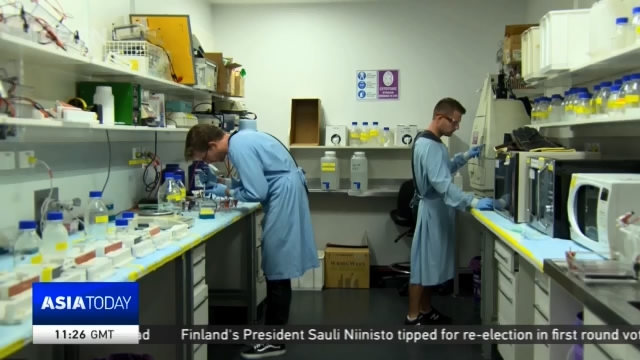
20:06, 28-Jan-2018
Malaria Prevention: Scientists believe they can stop malaria parasite infections

An international team of researchers says it's made a major breakthrough in the fight against malaria, which continues to kill hundreds of thousands of people each year. Scientists say they now understand how the parasites carried by mosquitoes infect humans - and they believe they've found a way to stop that happening. Greg Navarro explains.
For associate professor Wai-Hong Tham, the quest to better understand malaria - started with trying to answer a question.
WAI-HONG THAM, ASSOCIATE PROFESSOR WALTER AND ELIZA HALL INSTITUTE OF MEDICAL RESEARCH "How one of the most common malaria parasites actually gets into your human blood, particularly in really young red blood cells."
It took an international team of scientists, including the Melbourne researcher, and a unique approach to find the answer that no one had discovered before. They focused on a parasite carried by mosquitoes, and the process it uses to infect humans.
WAI-HONG THAM, ASSOCIATE PROFESSOR WALTER AND ELIZA HALL INSTITUTE OF MEDICAL RESEARCH "It is a very specific interaction between a human protein and a parasite protein and we call those lock and key interactions and so if you can actually stop the key from entering the lock you can actually stop the parasite from getting into the blood."
Scientists say malaria has existed for centuries - and used that time to adapt and become highly resilient.
ALAN COWMAN, DEPUTY DIRECTOR WALTER AND ELIZA HALL INSTITUTE OF MEDICAL RESEARCH "The malaria parasite is very smart - it's able to change its spots like a tiger changing its spots and essentially change the way it looks and becomes invisible to the humans that it infects, and continue to cause disease and be passed on to the next human via mosquitoes."
GREG NAVARRO MELBOURNE "Researchers say they have made great strides in combating malaria in the last decade reducing the number of deaths by nearly 50%, but it still affects roughly 200 million people around the globe, and kills almost half a million each year."
And according to the Centres for Disease Control and Prevention, it remains the leading cause of death and disease in many developing countries.
Tham says the information she and other researchers have uncovered could lead to a highly effective vaccine - because they've figured out a way to use antibodies to block the parasite from getting into red blood cells. And scientists believe that process could one day help stop infections from other deadly infections.
WAI-HONG THAM, ASSOCIATE PROFESSOR WALTER AND ELIZA HALL INSTITUTE OF MEDICAL RESEARCH "Through vaccination (we can) actually elicit human antibodies that can actually block this parasite from recognising this protein and essentially stop entry into these young red cells.”
Tham and other researchers plan to use antibodies on the same parasite found in different parts of the world, to test just how effective their discovery really is. Greg Navarro, CGTN, Melbourne.

SITEMAP
Copyright © 2018 CGTN. Beijing ICP prepared NO.16065310-3
Copyright © 2018 CGTN. Beijing ICP prepared NO.16065310-3